|
The new State of Israel welcomes Abba Hillel Silver
Rabbi Meir Azari of
Beit Daniel - The Center for Progressive Judaism in Tel Aviv wrote
in the
Winter 1996 CCAR Journal of Abba Hillel Silver's visit in August
1948, shortly after
the establishment of the state.
|
Who remembers
that, when Rabbi Silver came to Israel shortly after its
establishment, he was welcomed by a crowd numbering tens of
thousands? "This visit in Israel received a scope of a
national holiday," writes Isaiah Vinograd in his book on
Abba Hillel Silver. "It was an occasion of great value to
the future of Israel's relations and communication with
diaspora Jews. In the demonstration of welcome, which was
the first of such magnitude in the history of the land ...
the people expressed not only their personal gratitude to
the man who headed our struggle in the United States and
United Nations during the terrible crisis, but also the
identification of the people with his political approach in
the World Zionist Movement." |
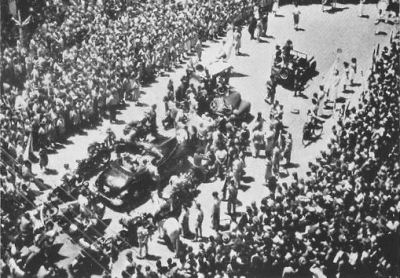
Abba Hillel Silver (in open car)
greeted by crowds in Israel.
Postage Stamp
|
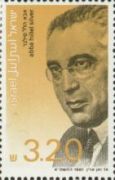 |
|
In 1981 the State of Israel issued this 3.2 shekel postage stamp
to honor Rabbi Abba Hillel Silver.
Shown without its tab
(State of Israel stamps are printed with the tabs below the bottom
row of stamps having some text describing the stamp), it is cataloged
as ScottŪ 778.
To see the stamp on the website
Famous Portraits on the
Stamps of Israel,
click here.
The site is by Dr. Samuel Zwetchkenbaum of the U. of Michigan. |
Abba Hillel Silver streets
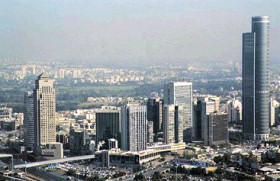 |
|
Six cities
in Israel have a street named in honor of Abba Hillel Silver.
Best known is Abba Hillel Silver Street in the Ramat-Gan
section of Tel Aviv, its financial and business district and
a world center for diamond cutting and marketing. At the
right of the picture is Israel's tallest office building,
completed in 2001. |
Kfar Silver
In 1954 the
Zionist Organization of America
established Kfar Silver, an
agricultural high school in
Ashkelon, in southern Israel on the Mediterranean, as a tribute to its
former president Rabbi Abba Hillel Silver. (Kfar means field.)
Begun as an
agricultural school, Kfar Silver now offers more academic
programs. Seventy percent of its 1,000 students are new immigrants,
mostly from the former Soviet Union, Ethiopia, and Latin America. Its
facilities are used intensively each summer for a variety of camping
experiences.
more ..
The
ZOA still owns Kfar Silver but in March 2006 the
Forward
reported that it has not sent the school money for at least eight years.
World Zionist Organization
SORRY ALL THESE WZO LINKS ARE BROKEN
The World Zionist Organization presents several pages on Rabbi Abba Hillel Silver, who is
perhaps best known as a leader in the Zionist movement. You will find a biography (with the photo we
display on our Welcome page) and a description of his leadership in events in the 1940's such as the Biltmore Conference that
helped to establish the State of Israel.
The pages are in Homeward Bound, an
interactive Zionist exposition, and in The
Time Machine. The exhibit, well worth bookmarking and revisiting, is part of the pages
of the Hagshama Department on the web site of the Jewish Agency for Israel - World Zionist Organization
in Israel. The literal meaning of Hagshama is "fulfillment" -- the realization
of Zionism which is Aliyah (literally "going up") to Israel.
Inaugural Prayer
On January 20, 1953 Rabbi Abba Hillel Silver spoke at the
inauguration of Dwight D Eisenhower. He was only the second
rabbi to offer a prayer at this political ritual. (Four years before, Harry Truman
had
included a rabbi in his inauguration.)
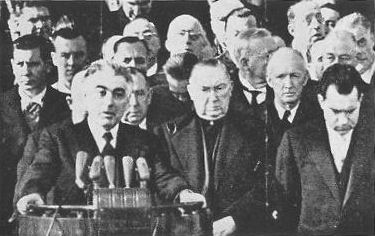
At the inauguration of Dwight D.
Eisenhower
Eisenhower is directly behind Silver. Richard Nixon is at the right.
Some think he
said the invocation at the opening of the
ceremony. Others believe he gave the benediction at the closing. Actually his was a third prayer,
offered after the
invocation and before the benediction. In this way the planners of Inauguration
Day did not depart from the usual
practice of a Protestant minister and a Roman Catholic priest saying the invocation and benediction.
The NY Times
account of the inaugural wrote:
|
"He [Eisenhower]
brushed away a tear when a special prayer was offered for
him by Rabbi Abba Hillel Silver of Cleveland. The Rabbi had
defended General Eisenhower last fall against charges by Mr.
Truman that the General in his campaign had accepted the aid
of those who practiced Nazi tenets of racial
discrimination."
|
|
Though he voted for Democrats,
Abba Hillel Silver was friendly to the Republican
party at a time when almost all Jewish voters voted Democratic.
He did not want the "Jewish vote" to be taken for granted by
the Democrats. Silver made a point to note that he never
openly supported a political candidate.
He offered the invocation at the 1944 Republican
convention. (Raphael, 110).
more |
|
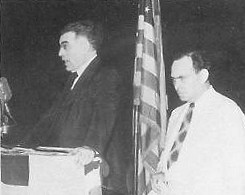 |
|
Giving
the invocation Rep. Joe Martin (r) |
The page is a story by Post reporter Edward T Folliard in the January 21, 1953 issue
of the
Washington Post.
Edward R Murrow's Person to Person
TV show November 12, 1954
Ed Murrow's
30 minute television shows on CBS ran from 1952 through 1961. The usual
format would split each show between a serious figure from government,
industry or the world of ideas, and the second segment from what we
would call today "popular culture" such as entertainment or sports.
On November 12, 1954 the show began with Murrow visiting with Rabbi
Silver and his wife Virginia in their Shaker Heights home. Then he
interviewed actors Tony Curtis (Bernie Schwartz) and Janet Leigh.
LIFE Magazine - 12 Great American Preachers
The April 6, 1953
issue of LIFE Magazine included a photo essay "12 Great American
Preachers" by Mark Kauffman. Abba Hillel Silver was the only rabbi
featured. The eleven other "preachers" included Protestants Reverend
(Billy) Graham (then only 34) and Dr. Norman Vincent
Peale and Roman Catholic Bishop Fulton J. Sheen.
The caption is shown
below.
|
Rabbi Abba
Hillel Silver
Jewish Reformed (sic)
Dr. Silver,
who stands here beside a replica of Michelangelo's Moses
in the Temple in Cleveland, has the imposing look of an
ancient Jewish leader. Tall and dark, he has a massive head
and a shock of black, graying hair. When he preaches his
words come out in organ tones. Born in Lithuania, Dr. Silver
represents the fifth generation of rabbis in his family.
Recalling that Moses, because he was "slow of speech" had to
have his brother Aaron talk for him, Dr. Silver feels that
the modern rabbi still needs to speak for Moses. "I have
always looked on religion as a quest for social justice and
a quest for God. The one found greatest expression among the
prophets, the other among the mystics. In preaching I try to
synthesize the two." An ardent Zionist, Dr. Silver
organized support to get resolutions favoring the new state
of Israel through both the U.S. Congress and the U.N.
Assembly. More recently he made a deep impression by the
moving prayer he offered at the Eisenhower inauguration. |
Essays about Abba Hillel Silver
For books about him on
this site, click here.
Chapter
One of Donald Neff's Fallen Pillars: U.S. Policy towards Palestine and Israel
since 1945, tells how Abba Hillel Silver organized and led American Zionists in ways
that helped change modern Jewish history. Entire chapters are in the Washington Post's Books and Reading
section.
Abba Hillel Silver
chair at Case Western Reserve University
The Abba Hillel Silver Chair of Jewish
Studies at Case Western Reserve University in Cleveland was established
in 1964 with gifts from the Edith Anisfield Wolf Fund of the Cleveland
Foundation, the Louis D. Beaumont Foundation, and the Jewish Community
Federation of Cleveland.
Since January 2000 the Silver chair has
been held by
Peter Haas, an ordained Reform rabbi (H.U.C. 1974) who earned a
Ph.D. in Jewish Studies from Brown University in 1980. Past holders of
this chair were the late Bernard Martin (1966-1982) and
Susannah Heschel (1991-1998),
now Eli Black Professor of Jewish Studies at Dartmouth.
For our page on the
chair, click here.
Near the end of days
This is not a story of recognition, but
rather a story of Abba Hillel Silver in his later years when he no
longer occupied leadership roles in American or world Zionism. See You're So Vain, You
Probably Think This Sermon's About You by Rabbi Benjamin Scolnic. To
read the entire sermon,
click here.
|
A friend of mine told me a story that I
have never gotten out of my mind. It's about Rabbi Abba Hillel Silver, one
of the great figures of modern Judaism. He was a great Zionist. He was one
of the reasons that the State of Israel was re-created in our time.
My friend was a young rabbi in
Philadelphia and he was asked to pick Silver up at the train station. He
was very honored to do so, and found Silver, towards the end of his life,
to be charming and bright and attentive. But Silver's heyday was over, and
only a group of twenty or so came to hear the man who had once roused the
crowds. After the speech, my friend took Silver back to the train station.
They had some time before the train came. The train station was empty. It
was a cold, bleak winter night. And so my friend asked, "Rabbi Silver, I
only mean you respect with this question. Why are you here? It's almost
insulting for you, at this point, to spend your day speaking as you just
did to such a small group. You should be at home, relaxing, you shouldn't
be here in this station on this winter night.
And Silver looked at him and
said, "I thank you for your caring. But remember Moses. When God told him
that he could not go to the Promised Land, Moses asked if he could go as a
foot soldier. He knew that he could no longer be the leader of the
Israelites, that he was older and burned-out and that the Israelites
needed a new leader to conquer the Promised Land. But he wanted to go, and
he was content to go any way he could, even as a common foot-soldier. And
so that, my young friend, is why I'm here; I'm a foot soldier now. And I'm
happy to play this role."
Abba Hillel Silver had played a leading
role; now he was willing to play a supporting role. I would have expected
the great Rabbi Abba Hillel Silver to see that little trip to Philly as a
comedown, as beneath him, as a blow to his pride. But he wasn't that vain.
He mentioned Moses. Moses was the greatest figure in human history, and he
was, according to the Torah, the humblest of men."
|
|